MIDI controllers have transformed the landscape of music production, providing a versatile means to create, edit, and perform music.
Whether one is a budding musician or an aspiring producer, gaining an understanding of what a MIDI controller is and its significance can be instrumental in achieving success in the field.
This guide will examine key features to consider when selecting a MIDI controller, recommend several top choices for beginners, and offer guidance on making an informed decision based on individual requirements.
Explore the options available and discover the ideal MIDI controller to enhance your music-making experience.
What is a MIDI Controller?
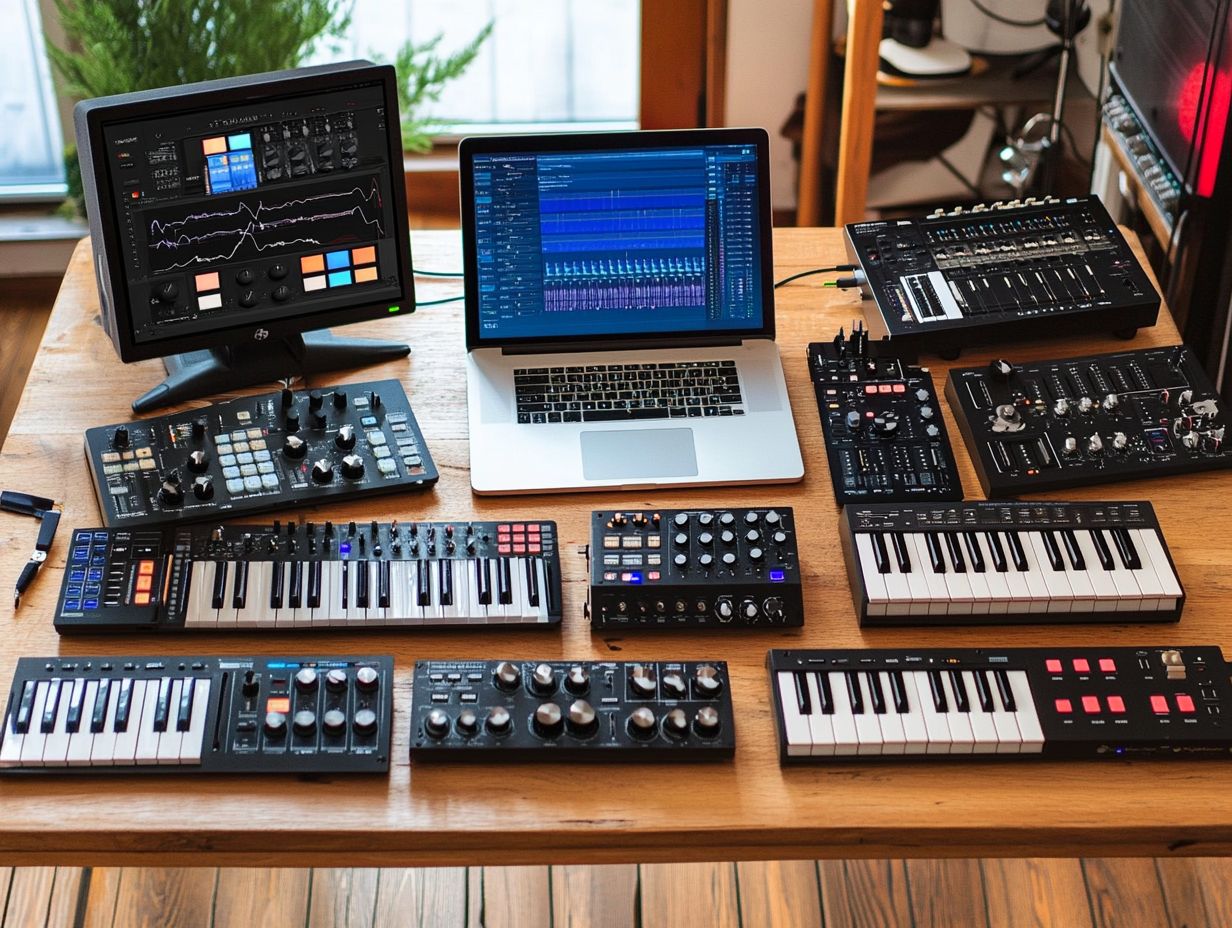
A MIDI controller is a highly versatile tool for music production that facilitates interaction between musicians and producers with digital audio workstations (DAWs) and software instruments through the use of MIDI technology.
These devices are available in various formats, including MIDI keyboards, control surfaces, and drum pads, each offering essential features that support music composition and live performance.
Why Use a MIDI Controller?
Utilizing a MIDI controller can greatly enhance the music production experience, particularly for beginners seeking to engage in music composition and performance.
These controllers offer an intuitive method for controlling MIDI note data, programming rhythms, and integrating seamlessly with a wide range of music production software and digital audio workstations.
Key Features to Look for in a MIDI Controller
When selecting the most suitable MIDI controller for your requirements, it is essential to evaluate key features that can significantly enhance your music production capabilities.
Important considerations may include:
- Build quality
- Key range
- Portability
- Performance features such as velocity-sensitive keys, drum pads, and programmable controls
All of which ensure compatibility with your preferred software instruments.
Sensitivity and Responsiveness
Sensitivity and responsiveness are essential characteristics of a MIDI controller, significantly impacting its ability to capture the nuances of a performance accurately. Controllers equipped with velocity-sensitive keys and touch sensitivity offer a more expressive playing experience, enabling nuanced MIDI modulation and dynamic sound triggering.
When a musician plays a note, the velocity-sensitive keys respond to the intensity of each keystroke, providing a customized sonic output that reflects the player’s emotion and intention. This capability not only enhances MIDI expression but also preserves subtle variations in dynamics, making the performance feel more vibrant and authentic.
A controller that excels in sensitivity fosters greater creativity in musical interpretation, allowing the artist to explore intricate layers of sound and rhythm, ultimately resulting in a richer auditory experience.
Number of Keys and Pads
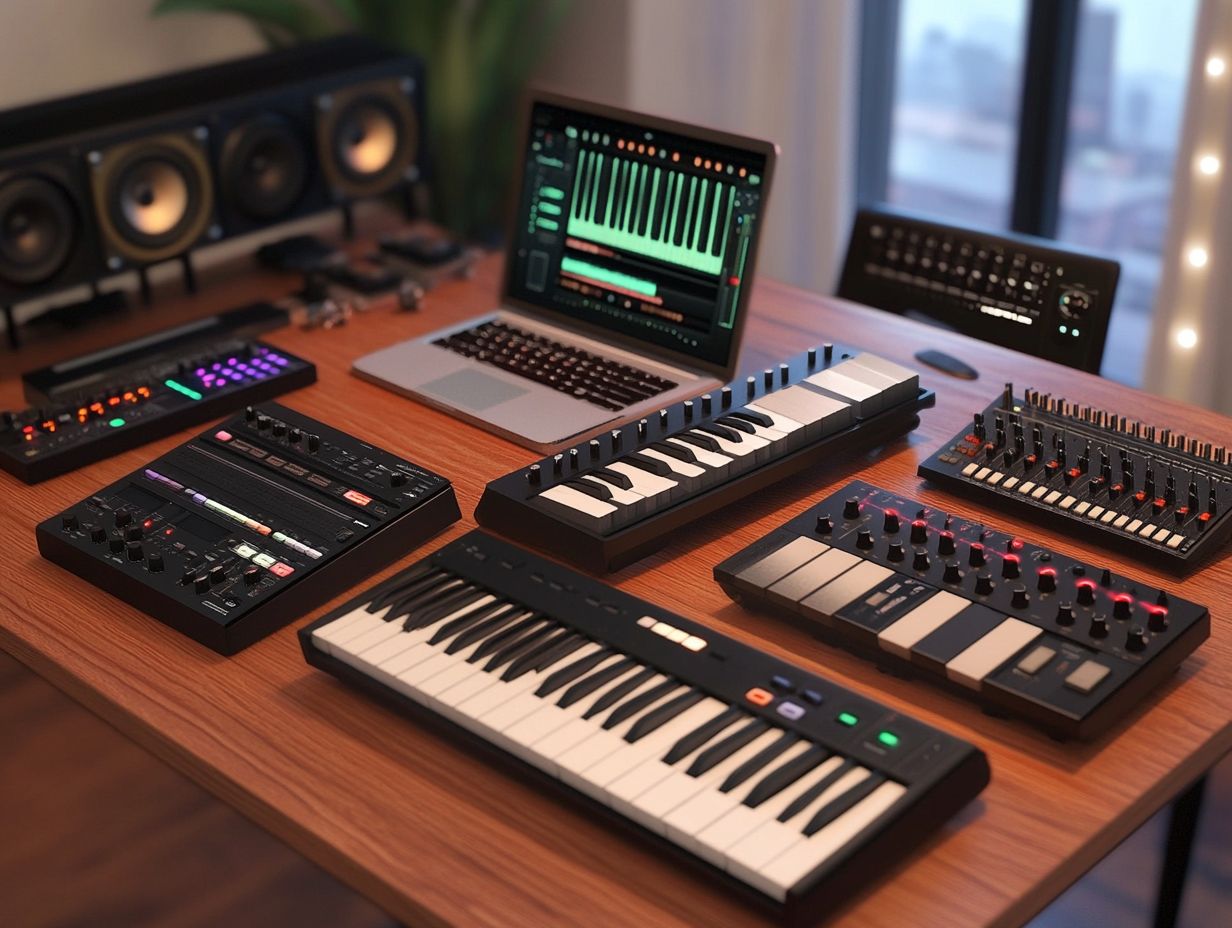
The number of keys and pads on a MIDI controller is a critical factor in assessing its utility for music production and performance. A broader key range offers enhanced versatility for playing melodies and harmonies, while compact designs with performance pads can improve workflow efficiency and portability.
This variety in configuration is essential for artists to customize their setup in accordance with their preferred genre or compositional style. For example, electronic music producers may find it advantageous to utilize a controller that prioritizes performance pads for triggering samples and manipulating beats, thereby facilitating a dynamic live setup.
Conversely, composers focused on classical or instrumental works can benefit from a full-sized keyboard that allows for seamless navigation of complex chord progressions.
Ultimately, achieving the right balance between keys and pads is vital for harmonizing a musician’s creative process, ensuring that they possess the optimal tools at their disposal, whether working in a studio environment or performing on stage.
Top MIDI Controllers for Beginners
For beginner musicians entering the realm of music production, the selection of an appropriate MIDI controller can significantly impact their creative journey.
The most suitable options generally possess user-friendly interfaces, essential functionalities, and reasonable price points, facilitating a smoother navigation of the MIDI learning curve for newcomers.
Budget-Friendly Options
When searching for budget-friendly MIDI controllers, it is essential to identify options that provide an excellent price-to-performance ratio while delivering the necessary features for effective music production. Many compact designs are equipped with velocity-sensitive keys and programmable controls, making them suitable for beginner musicians operating within a budget.
These controllers often include user-friendly software that enhances their overall value, enabling users to begin creating music immediately without the need for costly add-ons. Features such as built-in pads for triggering samples, knobs for adjusting parameters, and lightweight designs ensure portability—ideal for artists who wish to produce music while on the move.
By concentrating on the best models available, individuals can uncover affordable options that do not compromise on quality or usability, thereby maximizing creativity without incurring excessive expenses.
Best Overall Performance
Identifying the most effective MIDI controllers necessitates an examination of options that offer a comprehensive array of performance features. Key considerations include an intuitive user interface, responsive keys, and extensive integration capabilities with digital audio workstations (DAWs).
Highly rated models frequently receive favorable user reviews for their reliability and versatility in both studio and live performance environments.
For example, controllers that include velocity-sensitive pads and knobs enable seamless manipulation of virtual instruments and effects, making them particularly suitable for musicians and producers. Additionally, models equipped with built-in arpeggiators and sequencers can significantly enhance creative workflows, allowing artists to experiment with rhythms and melodies spontaneously.
User feedback frequently emphasizes the durability of these devices, noting their ability to withstand the demands of frequent travel or live performances. Ultimately, selecting a MIDI controller that incorporates these essential features can elevate the overall music production experience, ensuring both fidelity and flexibility.
Tips for Choosing the Right MIDI Controller
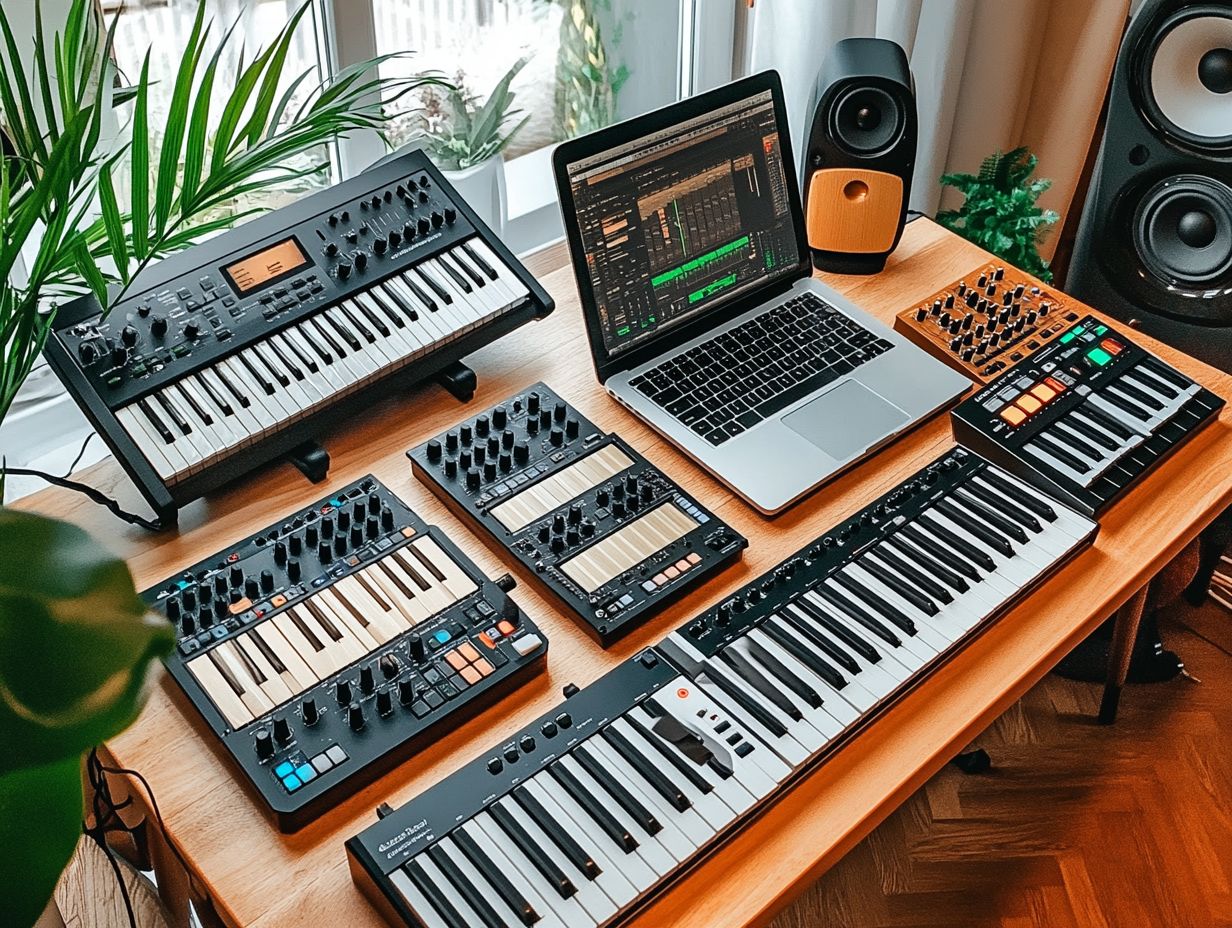
Selecting the appropriate MIDI controller can be a challenging endeavor, especially for individuals who are new to MIDI technology and its diverse functionalities.
By taking into account factors such as MIDI connectivity options, ease of setup, and essential features, one can make a well-informed decision that aligns with their music production objectives.
Considering Your Music Production Needs
Before purchasing a MIDI controller, it is imperative to consider your specific music production needs and how the controller will integrate into your creative workflow. Factors such as the music genres you intend to produce and the potential necessity for additional MIDI accessories to enhance your setup should be carefully evaluated.
Evaluating the MIDI output capabilities of the controller can have a significant impact on your workflow efficiency. For instance, if your focus is on electronic dance music, you may prioritize controllers equipped with pads for sound triggering and beat creation. Conversely, individuals who favor orchestral compositions might find that a keyboard with weighted keys provides a more authentic playing experience.
Furthermore, it is essential to assess how different controllers interface with your software and other equipment, as seamless compatibility will facilitate a smoother production process. Making an informed decision can greatly enhance your musical capabilities and foster creativity.
Reading Reviews and Comparing Prices
Reading user reviews and comparing prices are essential steps in the selection process for a MIDI controller, as they offer valuable insights into brand reputation and the experiences of other musicians. This information assists in identifying controllers that provide the optimal price-to-performance ratio and effectively meet individual needs.
By dedicating time to examine reviews, potential buyers can uncover not only the advantages and disadvantages of various options but also the nuanced experiences of users who have previously owned those products. Such insights can significantly inform purchasing decisions, ensuring that an investment considers not only the aesthetic appeal of a controller but also its reliability and functionality in practical applications.
Comparing prices across different retailers provides a comprehensive understanding of market trends and available promotions, enabling consumers to capitalize on opportunities that align with their budget while maintaining a commitment to quality.
Together, these strategies give the power to consumers to make informed choices that align with their specific musical objectives.
Frequently Asked Questions
What are the best MIDI controllers for beginners?
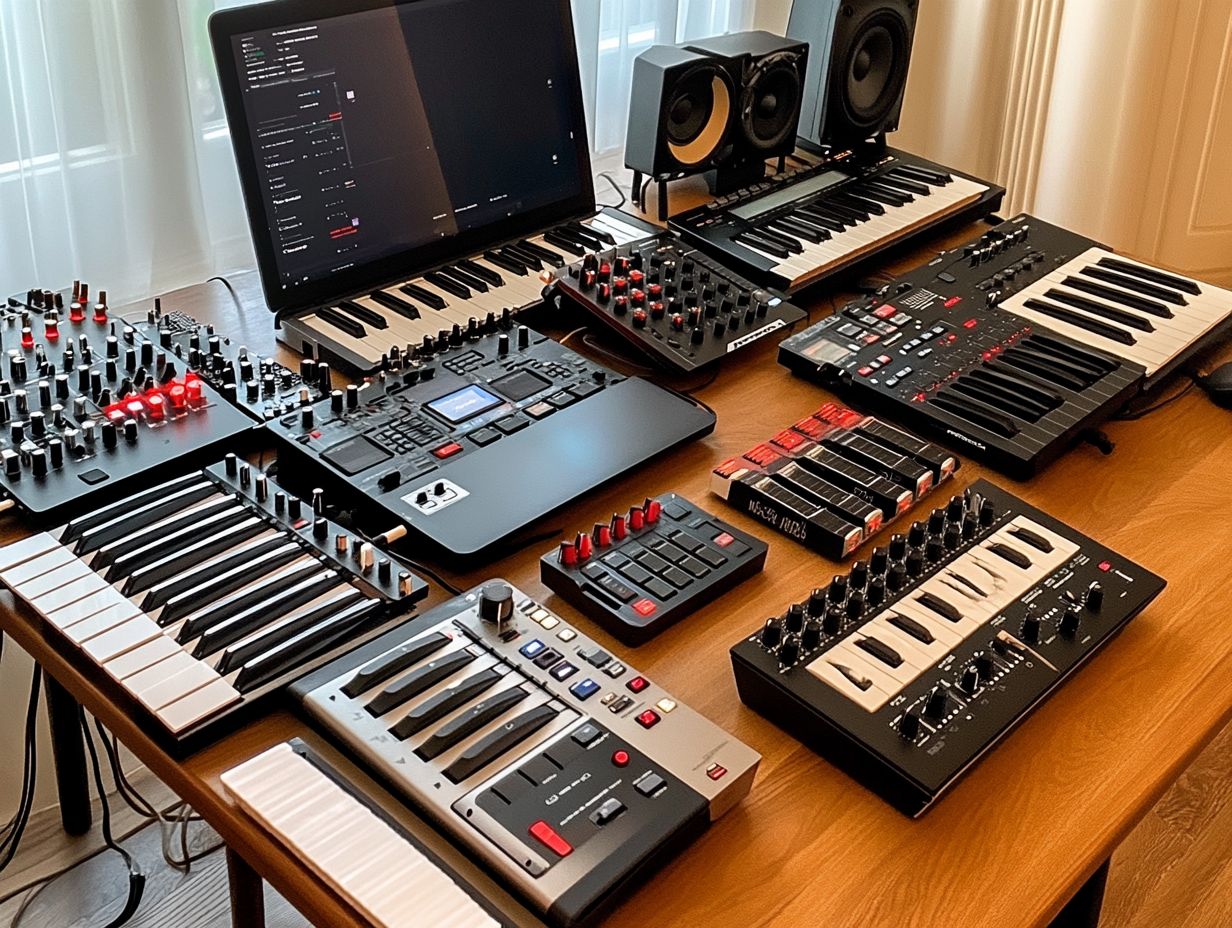
Some of the best MIDI controllers for beginners include the Akai MPK Mini MKII, Novation Launchkey Mini MK3, and Arturia MiniLab MKII.
Do I need a MIDI controller as a beginner music producer?
While it is not necessary to have a MIDI controller as a beginner, it can greatly enhance your music production experience and make it easier to create and manipulate sounds.
What features should I look for in a MIDI controller for beginners?
As a beginner, you should look for a MIDI controller with a compact size, a reasonable number of keys or pads, and user-friendly software compatibility.
Are there any budget-friendly options for MIDI controllers for beginners?
Yes, there are many budget-friendly options for MIDI controllers for beginners, such as the Akai LPK25, Korg nanoKEY2, and M-Audio Oxygen 25.
Can I use a MIDI controller with any music production software?
Most MIDI controllers are compatible with a wide range of music production software, but it is always best to check the compatibility before purchasing.
Is it better to start with a MIDI keyboard or pad controller as a beginner?
This ultimately depends on your personal preference and the type of music you want to create. Keyboard controllers are great for playing melodies and chords, while pad controllers are better for creating and manipulating beats.

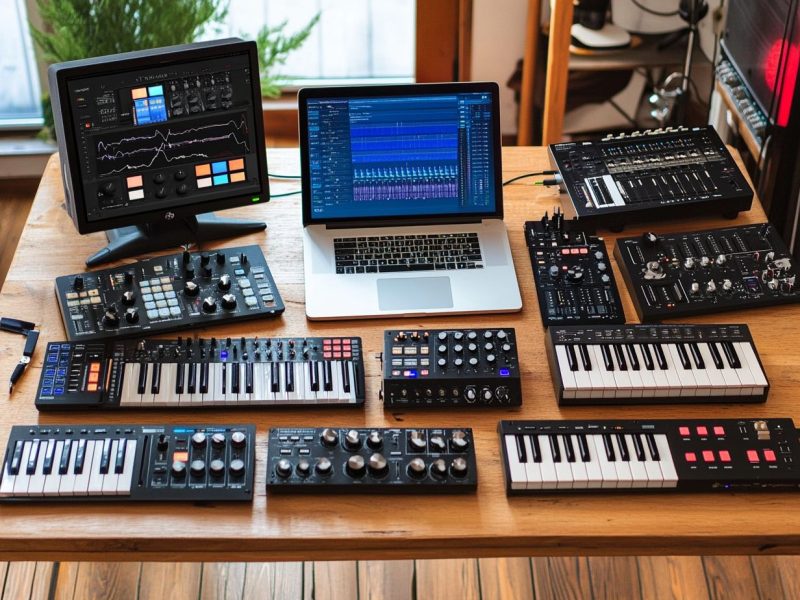
 Unleash Your Performance with the Best Portable PA Systems
Unleash Your Performance with the Best Portable PA Systems